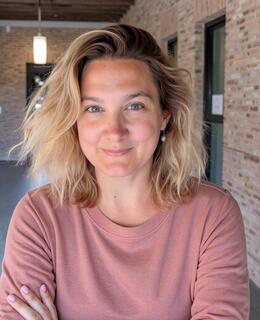

Dr. Veronica Bruno
Positions
Full Member
Hotchkiss Brain Institute
Associate Member
Mathison Centre for Mental Health Research and Education
Asistant Professor
Cumming School of Medicine, Department of Clinical Neurosciences
Neurologist
Movement Disorders Program
Contact information
Web presence
Phone number
Office: 403-210-7542
I'm looking for...
Study participants
We are recruiting participants for multiple clinical research studies in the field of Parkinson's disease and other Movement Disorders.
Research partners
We always seek collaborations with multibackground researchers interested in the fields of pain and related non-motor symptoms in Movement Disorders.
Learning opportunities
We are always delighted to add to our team enthusiastic students interested in clinical research.
Background
Credentials
MD, Universidad de Buenos Aires, Buenos Aires, Argentina, 2007
MPH, Harvard T.H Chan School of Public Health, 2016
FRCPC, Royal College of Physicians and Surgeons of Canada, 2021
Educational Background
Neurology Residency FLENI, Buenos Aires, Argentina, 2012
Movement Disorders Fellowship University of Toronto, 2015
Biography
Dr. Veronica Bruno is a neurologist with a subspecialty in movement disorders. She received her medical degree and neurology residency in Buenos Aires, Argentina. She completed her fellowship in Movement Disorders at the University of Toronto and a Master of Public Health degree at the Harvard TH Chan School of Public Health.
Dr. Bruno was recognized with different international awards including the American Academy of Neurology and American Brain Foundation Clinical Fellowship and the Argentine Presidential Fellowship in Science and Technology, part of the U.S. State Department’s ‘100,000 Strong in the Americas’ initiative.
Dr. Bruno’s primary interest is the treatment of advanced Parkinson’s disease, with a particular research interest in pain and other non-motor symptoms of the disease. She has also a special interest in Global Neurology and the search for innovative solutions to improve the quality of neurological care in low and middle-income countries.
Research
Areas of Research
Our vision is to decipher pain and related non-motor symptoms in PD and other movement disorders and provide evidence-based, safe and useful treatments to improve patients' quality of life.
Pain is defined as an unpleasant sensory and emotional experience associated with actual or potential tissue damage or described in terms of such damage. By itself, pain represents one of the most critical determinants of health-related quality of life. However, the effects of pain can be even more devastating in patients already suffering the symptoms of a neurodegenerative disease such as Parkinson's disease (PD) or other movement disorders. Patients with PD deal in their daily life with the motor aspects of the disease, the motor complications of the treatment, and the confluence of the non-motor symptoms. In addition, up to 85 % of patients with PD report pain through the course of the disease that can become chronic, decrease their quality of life significantly and even overtake the rest of the symptoms burden. Similar scenarios are faced with patients with different movement disorders.
The current knowledge about pain's mechanisms, associations, and implications in PD and other movement disorders is poorly understood. Our goal is to contribute to understanding this problem and developing therapies that will directly impact patients' lives.
Participation in university strategic initiatives
Projects
- Effect of different types of pain on quality of life in Parkinson's disease. Association with motor and non-motor symptoms, and caregiver burden.
- Central mechanisms of pain subtypes in Parkinson's disease: a pilot structural and functional MRI study.
- Development and validation of an assessment tool for pain in adult-onset idiopathic dystonia (dystonia pain scale - DPS). Collaboration with Dr. Davide Martino.
- Defining non-ataxic extracerebellar (non-motor) symptoms associated with hereditary ataxias. Collaboration with Dr. Elizabeth Slow, University of Toronto.
- Effects of pain on decision making in Parkinson's disease. Collaboration with Prof. Tomas Ward, School of Computing, Faculty of Engineering and Computing, Dublin City University, Ireland.
- Pilot study: identifying the optimal animal model for the study of pain in Parkinson's disease
- Botulinum toxin A (Onabotulinumtoxin A) for foot dystonia-associated pain in Parkinson's disease. A randomized, double-blind placebo control study.
- Apomorphine effect on pain in Parkinson's disease: A randomized, double-blind placebo cross-over study
- Utilization in the year before death of acute care (hospital, emergency, intensive care unit), homecare, facility living and palliative care resources for Albertans with Parkinson disease (PD), multiple system atrophy (MSA), progressive supranuclear palsy (PSP) and other neurodegenerative disorders. Collaboration with Dr. Janis Miyasaki, University of Alberta, and Dr. Ayn Sinnarajah, Queen's University.
Awards
- International Leaders Program (LEAP), International Parkinson and Movement Disorder Society. 2020
- Peggy Cahn Fund Fellowship, Harvard T.H. Chan School of Public Health.. 2015
- Argentine Presidential Fellowship in Science and Technology. Part of the U.S. State Department's "100.000 Strong in the Americas" initiative., 2014
Publications
In the News
More Information
Research Team:
- Beatrice Achen, Research Assistant
- Parisa Alizadeh, Research Assistant
- Karla Cantu-Flores, Research Assistant
- Marina Belen Romero Gordillo, Administrative Assistant
- Ellen McRae, Research Associate (nurse)
- Rick Kline, Research Associate (spiritual care)
- Michelle Liam, Research Associate (psychology)
- Kirsten Toews, Research Associate (community liaison)
- Connor Lang (student)
- Kinza Naser (student)
Are you the profile owner?
Login to edit.
